Etiqueta "Machine Learning"
Se han encontrado 6 Coincidencias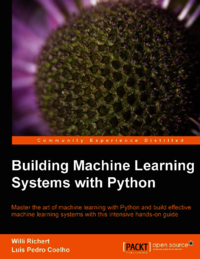
Building Machine Learning Systems with Python
Master the art of machine learning with Python and build effective machine learning systems with this intensive hands-on guide
253 Visitas | 397 Descargas | 2013-12-04 06:30:53 | abelm
Excelente libro del 2013 elaborado por programadores y profesionales de la bioinformática. El libro comienza haciendo una introducción a Machine Learning, y utilizando un ejemplo práctico y sencillo para que los estudiantes comiencen. Cap2, está dedicado en su comienzo a los problemas de clasificación con ejemplos reales, y analiza problemas más complejos de clasificación. Cap3 Agrupamiento, este capítulo utiliza un ejemplo de procesamiento de texto, añadiendo NLTK y analiza todo el proceso NLP para luego realizar clustering de textos. Capt4 Topic Modeling, un tema más complejo que analiza el LDA, similaridad en el espacio de temas(topic space). Cap5 También dedicado a clasificación pero mucho más fuerte, utiliza un ejemplo de medición de la calidad de las respuestas, es lo que se dice el análisis de un ejemplo avanzado. Cap6 Dedicado al muy actual tema del Análisis de Sentimientos, este tema es una de las tareas muy actuales del Procesamiento del Lenguaje Natural. Cap 7 y 8 dedicado a la Regresión, utiliza interesantes ejemplos para mostrar este tema de ML. Cap9 Regresa con más sobre Clasificación en este caso con un análisis del género musical, utilizando procesamiento de señales. Cap 10 Computer Vision. Cap 11 Reducción de la Dimensionalidad. Cap12 y final, como aprender de grandes colecciones de datos, aprender a procesar estos conjuntos eficientemente. Contiene un apéndice con referencias a dónde más leer para aprender sobre ML.
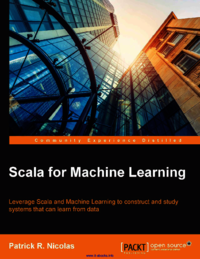
Scala for Machine Learning
Scala for Machine Learning
117 Visitas | 115 Descargas | 2015-11-02 15:43:18 | pecarrazana
Not a single day passes by that we do not hear about Big Data in the news media, technical conferences, and even coffee shops. The ever-increasing amount of data collected in process monitoring, research, or simple human behavior becomes valuable only if you extract knowledge from it. Machine learning is the essential tool to mine data for gold (knowledge). This book covers the "what", "why", and "how" of machine learning: • What are the objectives and the mathematical foundation of machine learning? • Why is Scala the ideal programming language to implement machine learning algorithms? • How can you apply machine learning to solve real-world problems? Throughout this book, machine learning algorithms are described with diagrams, mathematical formulation, and documented snippets of Scala code, allowing you to understand these key concepts in your own unique way.
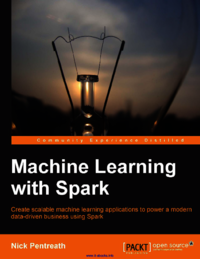
Machine Learning with Spark
Machine Learning with Spark
144 Visitas | 155 Descargas | 2015-11-02 15:59:02 | pecarrazana
In recent years, the volume of data being collected, stored, and analyzed has exploded, in particular in relation to the activity on the Web and mobile devices, as well as data from the physical world collected via sensor networks. While previously large-scale data storage, processing, analysis, and modeling was the domain of the largest institutions such as Google, Yahoo!, Facebook, and Twitter, increasingly, many organizations are being faced with the challenge of how to handle a massive amount of data. When faced with this quantity of data and the common requirement to utilize it in real time, human-powered systems quickly become infeasible. This has led to a rise in the so-called big data and machine learning systems that learn from this data to make automated decisions. In answer to the challenge of dealing with ever larger-scale data without any prohibitive cost, new open source technologies emerged at companies such as Google, Yahoo!, Amazon, and Facebook, which aimed at making it easier to handle massive data volumes by distributing data storage and computation across a cluster of computers. The most widespread of these is Apache Hadoop, which made it significantly easier and cheaper to both store large amounts of data (via the Hadoop Distributed File System, or HDFS) and run computations on this data (via Hadoop MapReduce, a framework to perform computation tasks in parallel across many nodes in a computer cluster).
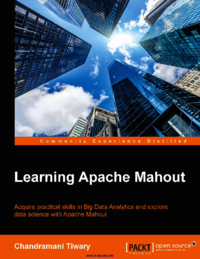
Learning Apache Mahout
Apache Mahout
114 Visitas | 106 Descargas | 2015-11-27 16:40:00 | pecarrazana
Learning Apache Mahout is aimed at providing a strong foundation in machine learning using Mahout. This book is ideal for learning the core concepts of machine learning and the basics of Mahout. This book will go from the basics of Mahout and machine learning, to feature engineering and the implementation of various machine learning algorithms in Mahout. Algorithm usage examples will be explained using both the Mahout command line and its Java API. We will conclude the book with two chapters of end-to-end case studies. Ideally, chapters 1, 2 and 3 should be read sequentially, chapters 4 to 8 in any order, and chapters 9 and 10 after chapter 1 to 8 have been completed.
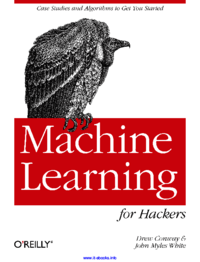
Machine Learning for Hackers
Machine Learning for Hackers
189 Visitas | 183 Descargas | 2015-12-11 18:19:51 | pecarrazana
What is machine learning? At the highest level of abstraction, we can think of machine learning as a set of tools and methods that attempt to infer patterns and extract insight from a record of the observable world. For example, if we are trying to teach a computer to recognize the zip codes written on the fronts of envelopes, our data may consist of photographs of the envelopes along with a record of the zip code that each envelope was addressed to. That is, within some context we can take a record of the actions of our subjects, learn from this record, and then create a model of these activities that will inform our understanding of this context going forward. In practice, this requires data, and in contemporary applications this often means a lot of data (perhaps several tera- bytes). Most machine learning techniques take the availability of such data as given, which means new opportunities for their application in light of the quantities of data that are produced as a product of running modern companies. What is a hacker? Far from the stylized depictions of nefarious teenagers or Gibsonian cyber-punks portrayed in pop culture, we believe a hacker is someone who likes to solve problems and experiment with new technologies. If you’ve ever sat down with the latest O’Reilly book on a new computer language and knuckled out code until you were well past “Hello, World,” then you’re a hacker. Or if you’ve dismantled a new gadget until you understood the entire machinery’s architecture, then we probably mean you, too. These pursuits are often undertaken for no other reason than to have gone through the process and gained some knowledge about the how and the why of an unknown technology.
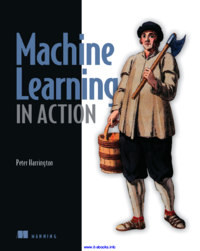
Machine Learning in Action
Machine Learning
190 Visitas | 210 Descargas | 2015-12-11 18:24:04 | pecarrazana
This book sets out to introduce people to important machine learning algorithms. Tools and applications using these algorithms are introduced to give the reader an idea of how they are used in practice today. A wide selection of machine learning books is available, which discuss the mathematics, but discuss little of how to program the algorithms. This book aims to be a bridge from algorithms presented in matrix form to an actual functioning program. With that in mind, please note that this book is heavy on code and light on mathematics. Audience What is all this machine learning stuff and who needs it? In a nutshell, machine learning is making sense of data. So if you have data you want to understand, this book is for you. If you want to get data and make sense of it, then this book is for you too. It helps if you are familiar with a few basic programming concepts, such as recursion and a few data structures, such as trees. It will also help if you have had an introduction to linear algebra and probability, although expertise in these fields is not necessary to benefit from this book. Lastly, the book uses Python, which has been called “executable pseudo code” in the past. It is assumed that you have a basic working knowledge of Python, but do not worry if you are not an expert in Python— it is not difficult to learn.
Contribuir
Usted puede contribuir con Libros UCLV, es importante para nosotros su aporte..
Contribuir